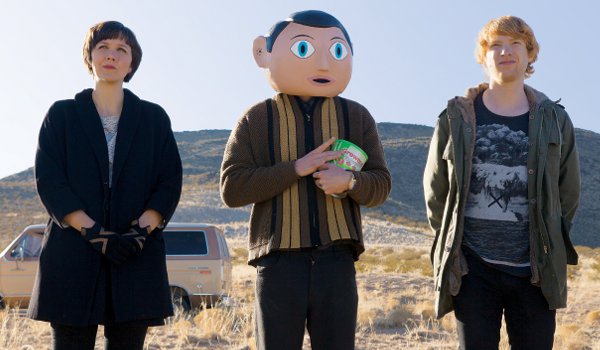Frank
Director: Lenny Abrahamson
Starring: Michael Fassbender, Domhnall Gleeson, Maggie Gyllenhaal
★★★★ (out of five)
“WHAT if I describe my facial expressions out loud?” suggests the eponymous Frank in Frank, the keenly awaited release from Ireland’s Lenny Abrahamson.
A surprisingly light-hearted affair for Abrahamson, Frank is nevertheless an intriguing muse upon the nature of idiosyncrasy, inherent musical talent and the weird aspects of creativity.
The Frank of the film’s title (played by Michael Fassbender) has to go to the trouble of describing his facial expressions to people because he hides them behind a grotesque fibreglass mask.
It’s common knowledge by now that the character is loosely based on Mancunian musician Frank Sidebottom, who during the 1980s shared stages with the likes of The Smiths, Stone Roses and Happy Mondays.
Frank Sidebottom was the persona of the late Chris Sievey, an eccentric performer in the Ivor Cutler or John Shuttleworth mould, who wore a papier-mâché mask that was either a goofy gimmick or a stroke of genius.
But the film’s story centres on the all-together less colourful character of Jon (Domhnall Gleeson), a mediocre keyboard player who dreams of musical greatness while living a life of relative comfort, or enduring a humdrum existence, in a pleasant coastal town.
 Maggie Gyllenhaal (Clara), Michael Fassbender (Frank) and Domhnall Gleeson (Jon)
Maggie Gyllenhaal (Clara), Michael Fassbender (Frank) and Domhnall Gleeson (Jon)Jon attempts to tighten the sinews of his limp song writing by staring wistfully at the sea, but finds lyrical eloquence elusive: “Childhood misery and mental illness, where to get that sort of inspiration?” he laments.
When chance pitches him into the world of a touring American avant-garde combo, he sees his opportunity. The band’s musical performance consists mostly of making a cacophonous din, over which leader Frank bellows incomprehensible lyrics while cavorting about the stage like an Egyptian mummy.
When a fight breaks out between band members it’s not immediately clear that the fracas isn’t part of the act.
Yet despite these inauspicious beginnings Jon joins up and decamps with the group to rural Ireland, where they intend to record what will be their musical masterpiece.
Things don’t quite go as hoped but while Jon is originally considered a meddlesome outsider to be shunned from the band’s exclusive clique, he soon forms a bond with the enigmatic Frank that draws the envy of the others. Jon steadily becomes dominant, posting the band’s news on Twitter and their recording clips on YouTube.
From being a tight alliance of obscure travelling players who are motivated by nothing more than creative urges, they become an overnight Internet sensation with a cult following, a booking at the Texan SXSW festival and a new sense of commercial potential: “We could be big,” Jon promises.
This shift in artistic priorities arouses the fury of Clara (Maggie Gyllenhaal), a committed artiste with cold eye and a hot temper. A struggle for control over the group’s inner dynamics ensues between Jon, Clara and the other members, the warring aesthetics sometimes erupting in physical violence.
All the while Frank retains a philosophy that sees inspiration in everything: “Crisis is creative,” he insists. His ideas swing between profound insight and soft whimsy, as when he announces a stray thread from a carpet as the subject of a composition: Lone-standing tuft/defy the foot.
There are moments when the narrative itself seems whimsical, lacking vigour or focus, but the movie’s purpose becomes clear in its closing scenes.
Journalist Jon Ronson (who co-wrote the script) briefly played with Frank Sidebottom’s band during the 1980s and he clearly intends to pay tribute to Sievey here. But this is a rock movie that fuses nuances of many wayward souls and troubled geniuses from popular music’s history.
Pop aficionados will identify in the Frank character the delicate innocence of Nick Drake, Syd Barrett and Ray LaMontagne, among others, and the compulsive creative energies of Captain Beefheart.
The movie often evokes Beefheart’s obsessive recording of his jagged Dadaist masterpiece Trout Mask Replica and the relationship he had with his musicians, who were more a collective community than a rock band.
Fassbender is terrific as Frank (though you don’t see much of him), making the character seem variously overbearing, vulnerable or touched. Gleeson, too, is impressive, offering a smooth fusion of affability and cunning.
Fassbender was last seen as bullying slave-holder Edwin Epps in Twelve Years a Slave, while Gleeson plays a psychotic in Calvary. Here they play vastly different roles, but then Abrahamson’s ambiguous characters always make viewers uncertain in their empathy.
Abrahamson has appeared in recent years as perhaps Irish cinema’s most significant film-maker, a director with a sure and subtle touch in using the medium for illuminating complex aspects of the human psyche, though Frank is more frolicsome than his earlier work.
This could remind us of Paul Thomas Anderson, a serious director who followed Boogie Nights (1997) and Magnolia (1999) with the relatively frivolous Punch-Drunk Love (2002). His next movie was the magnificent historical drama There Will Be Blood (2007).
By contrast Abrahamson’s next project is a challenging adaptation of Emma Donohue’s tightly-contained psychological novel Room.
But for now Frank proves again that Abrahamson is an astute filmic storyteller, and that both Michael Fassbender and Domhnall Gleeson are among the most versatile and notable film-acting talents around.
Frank is on general release across Britain from May 9.

